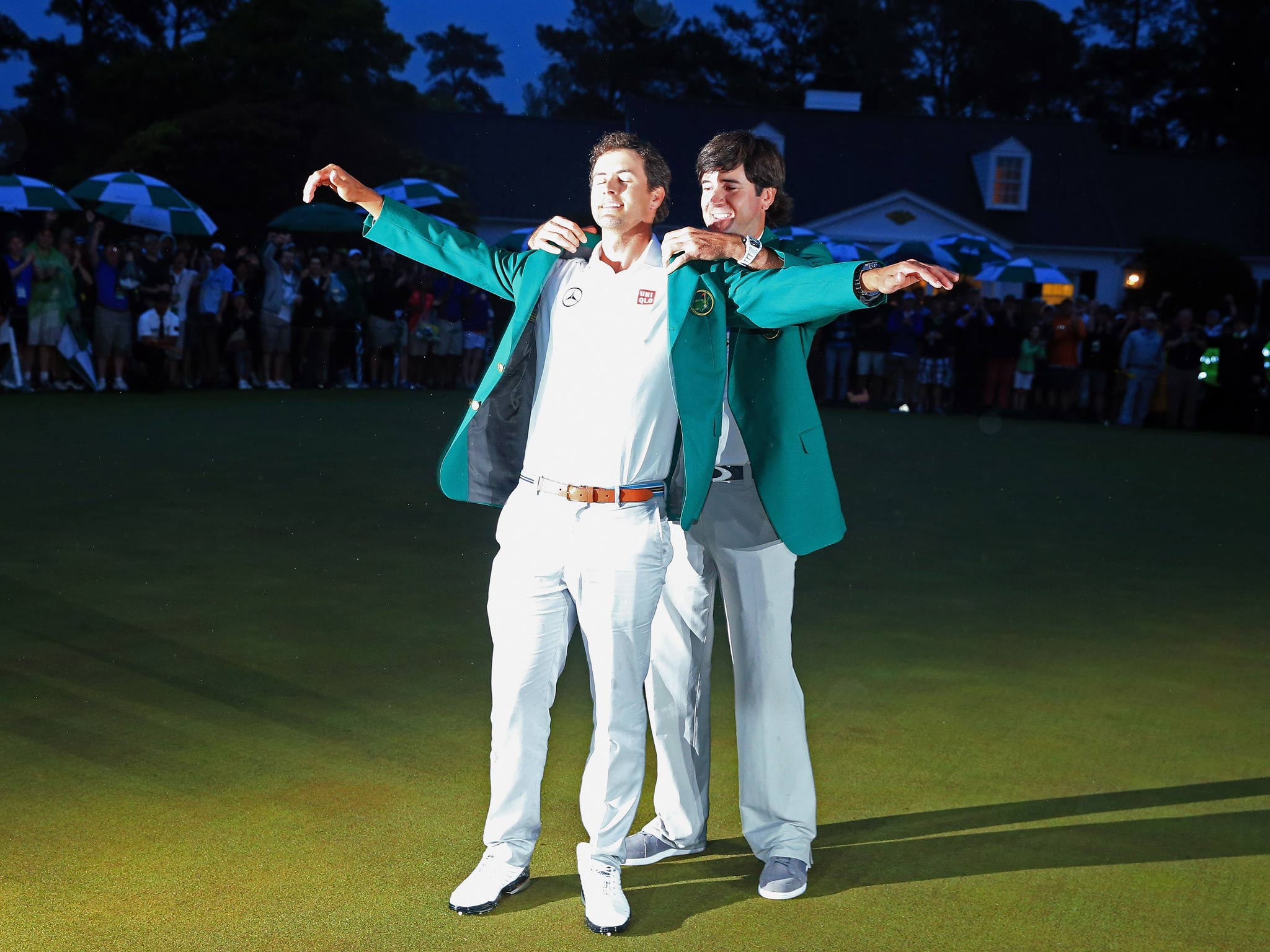The Masters 2013: How Greg Norman finally won a Green Jacket for Australia
Adam Scott reveals that the Great White Shark’s support gave him back the belief he had lost

Hottest Masters champion ever. The verdict was delivered in a text from a wife to her husband at Augusta. The perspective was all female, and widely shared, but there is plenty in Adam Scott for the man of the house to admire.
It might appear that he has it all, a green-jacketed Adonis of the fairways, but, in golfing terms at least, he has suffered. This was a redemptive tale, a win full of all the right messages delivered by a wholesome figure, who, only nine months ago, suffered the cruellest fate in sport, the loss of a great prize all but won.
Scott stood on the 15th tee at Royal Lytham with a four-shot advantage and did not win the Open. Scott is old school. The Claret Jug means as much to him as a Green Jacket. To watch Ernie Els give the speeches that day was a torture the scale of which even Ghengis Khan could not conceive.
Scott tried to tell us the four bogeys he brought home were not the consequence of a failing ticker, just bad luck. After watching him gun down the back nine at the Masters on Sunday with three birdies, including a nerve-shredder at the last, and subjugate Angel Cabrera in astonishing fashion in a play-off, we know that to be true.
Lytham was not the first crisis of his career. Loss of form is the episodic thumbscrew that pains them all at some point. Scott first reached his present ranking of world No 3 in 2008 but within a year had dropped out of the world top 50. The turning point came in the shape of His Blondness, Greg Norman, who chose him as a captain’s pick for the Presidents Cup international team to play the United States in 2009. It was a leap of faith by a man who had invested much love in Scott’s career, and it was pivotal in his march back to golfing prosperity.
“That was a big moment for me. It was kind of gut check time. My game was in a bit of a rut. I wasn’t enjoying it so much. But Greg as the captain had a lot of belief that I could win a point for his team. What that did was automatically put me into a world-class situation of playing. There’s no hiding in a Presidents Cup. I used that as a real motivator, as a way to make myself believe that I’m a great player again.
“If you don’t have that opportunity, sometimes it’s very hard to play yourself out of a rut back up to the top of the leader board in a tournament. But I got put in that situation of pressure all over again, and I needed that. You know, I took the ball from there and ran with it. It was a big boost for me.”
What was also appreciated was the support of Cabrera, a member of that 2009 team, who offered a consoling arm and some words of comfort. “He could see I was struggling. He pulled me aside and he said: ‘You’re a great, great player.’ Something I didn’t forget and really nice of him.” Cabrera does not say much in English. When he does it counts.
El Pato – The Duck, as Cabrera is affectionately known – deserves our praise and gratitude for the courage he showed at the age of 43 and ranked 269, taking this great tournament to the wire against a formidable opponent playing at a rare peak. His gesture on the 10th green in the play-off, a raised thumb in praise of Scott’s approach when the battle was at its keenest, might endure as this tournament’s defining act of sportsmanship.
After what had passed for sporting governance to keep Tiger Woods alive in the event the day before, Cabrera’s instinctive largesse restated golf’s values in the simplest of ways and restored our faith in the sport’s integrity. Cabrera was the giant in defeat that he was in battle, giving no quarter in pursuit of a third major championship and a warm handshake in defeat. The better man won, just.
So Scott becomes Australia’s first Masters champion in the same theatre that took its greatest player to the edge of despair. Norman’s defeat in 1996 defined that tournament as much as Nick Faldo’s victory. With Norman holding a six-shot advantage over the Englishman at the start of the final day and seemingly invincible, defeat was unimaginable.
Norman knew the scale of the challenge facing his protégé in the days after Lytham, and understands the significance of this response. “We had a discussion after that,’’ Norman said. “He played better than anybody for 69 holes and he knew he had the capability to win a major championship. The next day he focused on the future. I think he has the capability of winning a lot more majors. I want Adam to be the most successful golfer in Australian history. I’m very, very proud of him.”
Adam Scott factfile
Born: Adelaide, July 16, 1980
Professional wins: 20
Highest world ranking: 3 (currently)
2013 earnings: £1.37m
Career earnings: £24.7m
Timeline
1997: Wins world junior title
2000: Turns professional
2004: Wins Players Championship
2009: Drops to 76th in world ranking 2012 Leads by four shots with four to play in the Open but bogeys all four, losing out to Ernie Els
Join our commenting forum
Join thought-provoking conversations, follow other Independent readers and see their replies
Comments
Bookmark popover
Removed from bookmarks